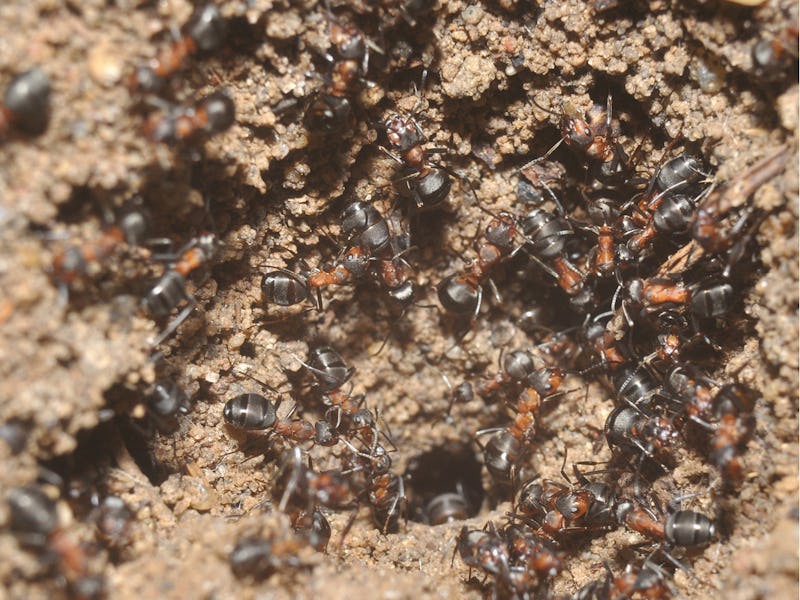A Dark, Cold, Sexless Ant Colony Thrives in a Nuclear Bunker
And you think your job sucks?

As far as wartime sacrifices go, it’s hard to beat the plight of the wood ants of Templewo, Poland.
There, near the border of Germany, a large colony has established over a Soviet nuclear arms base that was operational from the 1960s until 1992. Except, no one thought to tell the ants that the Cold War is over. And every year hundreds of thousands of ants soldier off and fall down a ventilation pipe into the weapons storage bunker below ground, never to see the light of day again.
In the bunker, the ants find themselves in total darkness, with very little food to eat. Temperatures rarely hit 50 degrees, even in the summer. But do these ants give up in despair? No, they do not. They simply keep working, building, and maintaining their mound. They’ll do it until they die, of starvation or old age, but it won’t matter. A younger generation is on its way, ready to cart off the fallen to a two-million-strong ant cemetery beyond the mound and continue their endless, pointless labor.
Wood ants set to work repairing their mound, recently dismantled by researchers looking for offspring. In the foreground, a vast ant cemetery claims millions of fallen soldiers.
Researchers stumbled upon this strange colony in 2013, after crawling into the bunker through “some illegally dug cracks” to count a small population of bats that had made a home inside the nuclear storage facility. The scientists, led by Wojciech Czechowski of the Polish Academy of Sciences, published their descriptions of the ants Monday in the Journal of Hymenoptera Research.
Monitoring since then has found no evidence that the colony is able to produce offspring. In July 2015 the researchers dismantled a section of the 10-inch-high mound looking specifically for larvae, pupae, empty cocoons, and queens, but found none. When they returned in January 2016, the damage had been repaired. The scientists suspect that the cold temperatures and paucity of nutritious food sources make reproduction impossible.
Nevertheless, the colony appears to be maintaining its size, and perhaps even growing. The researchers estimate that at least several hundred thousand ants, possibly a million, call the bizarre barren mound home.
A colony of free ants hums along above the surface, producing an endless supply of labor to the bunker mound below.
In the summer, the ants climb the walls of the bunker, perhaps in an effort to touch the warmer air coming from above. But the researcher saw no ants on the ceiling, and no evidence that any of them had ever returned to the mother colony above.
If the ants closer to the surface had self-awareness of their plight, surely by now they would have developed some complicated mythology about those lost down the pipe, destined to toil away below and never to return. They are the chosen ones, off to serve some higher purpose, they tell one another. Their work must mean something, though they are blinded to it in the darkness.
But here we are, like the omniscient narrator of some perfect dystopian fiction, and we know the truth: The war is over, and your cold, sexless mound serves no purpose except to bring some small comfort to the latest batch of arrivals that there is still some work to be done.